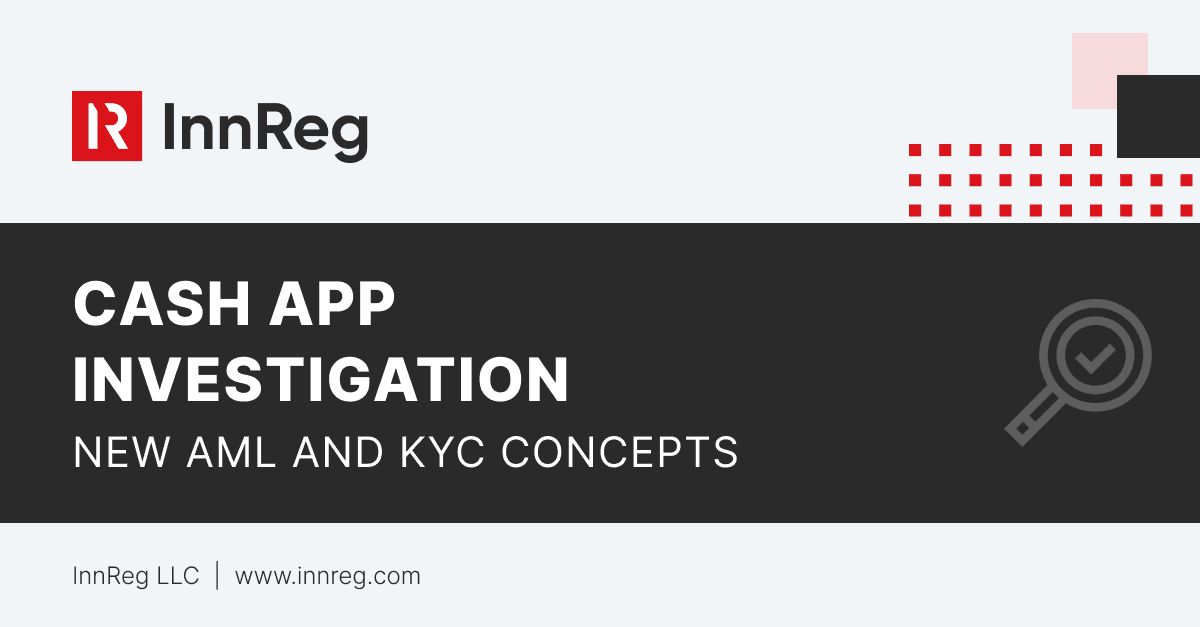Contents
In recent years, the proliferation of growth in the fintech sector has offered innovative solutions that make financial services more accessible and efficient. However, this rapid growth has also led to significant regulatory challenges, especially in the areas of Anti-Money Laundering (AML) and Know Your Customer (KYC) compliance.
A notable example of these challenges is the ongoing investigation into Cash App, a widely used peer-to-peer payment platform.
This case highlights the crucial need for fintech companies—and particularly those in the payments and neobanking verticals—and their banking partners to maintain robust compliance measures.
As the fintech industry continues to evolve, developing and implementing effective strategies and technologies is essential to support regulatory compliance efforts and prevent financial crime.
In this article, we will explore the details of the Cash App investigation, review its key findings, and discuss new approaches to AML and KYC in the fintech sector. By understanding the lessons from this case and adopting innovative compliance strategies, fintech companies can better navigate the regulatory landscape and reduce the risks associated with financial crime.
See also:

InnReg is a global regulatory compliance and operations consulting team serving financial services companies since 2013. If you need assistance with compliance or fintech regulations, click here.
Overview of the Cash App Investigation
In February 2024, a probe launched by the Financial Crimes Enforcement Network (FinCEN), along with the Securities and Exchange Commission (SEC) and the Commodity Futures Trading Commission (CFTC), uncovered significant gaps in AML and KYC processes within Cash App, a popular fintech platform owned by Block, Inc.
The investigation began after two whistleblowers alleged that Cash App had severe deficiencies in its AML and KYC practices. They claimed that the platform failed to properly verify its customers' identities, potentially allowing money laundering and other illicit activities to go unchecked.
In response to these allegations, the regulatory probe involved a thorough examination of Cash App's compliance measures, including its partnership with major banks like Visa and Wells Fargo, which are integral to its operations.
The investigation primarily focused on the period between 2016 and 2022, during which the whistleblowers asserted that Cash App's flexible due diligence procedures enabled fraudulent activities. These claims have prompted a wider discussion about the adequacy of regulatory frameworks for fintech companies and the responsibilities of their banking partners.
As the investigation unfolds, it sheds light on the critical importance of robust AML and KYC protocols in the fintech sector. The findings could lead to significant changes in how fintech companies operate, emphasizing the need for enhanced compliance measures to protect against financial crimes and safeguard user data.
Key Findings from the Cash App Investigation
The investigation into Cash App has revealed several critical issues regarding its compliance with AML and KYC regulations. These findings highlight significant gaps in the platform's due diligence processes and raise concerns about its ability to prevent financial crimes.
Customer Due Diligence Gaps
One of the most alarming findings from the investigation is the significant gaps in Cash App's customer due diligence (CDD) processes. Whistleblowers have alleged that Cash App did not have effective procedures to establish the identity of its customers. This lack of proper identification verification allowed potentially fraudulent accounts to be created and used without adequate scrutiny.
The investigation has shown that Cash App relied heavily on non-documentary verification methods, which may not be sufficient to mitigate certain types of fraud. These methods include using customer-provided information without requiring substantial documentation like government-issued IDs or proof of address. Such gaps in CDD processes made it easier for bad actors to exploit the platform for illicit activities.
Allegations of Money Laundering and Fraud
Another significant aspect of the Cash App investigation involves allegations of money laundering and fraud facilitated through the platform.
Whistleblowers have provided evidence suggesting that criminal organizations used the platform to launder money and finance terrorism. Transactions linked to offshore gambling sites, credit card fraud, and even entities sanctioned by the US Department of the Treasury's Office of Foreign Assets Control (OFAC) were identified.
These allegations point to severe shortcomings in Cash App's monitoring and reporting mechanisms. The platform's failure to detect and report suspicious transactions has raised concerns about its ability to effectively follow AML regulations. This situation not only exposes Cash App to regulatory penalties but also tarnishes its reputation and undermines customer trust.
New Trends for Enhancing AML in Fintech
In light of the findings from the Cash App investigation, fintech companies must adopt new strategies to enhance their Anti-Money Laundering practices.
Enhanced Identity Verification Techniques
One of the key areas for improvement is the implementation of enhanced identity verification techniques.
Traditional non-documentary methods are no longer sufficient to address the sophisticated tactics used by bad actors. Fintech companies should adopt more rigorous procedures, such as:
Multi-Factor Authentication (MFA): Requiring customers to use multiple forms of verification, such as biometrics (fingerprints, facial recognition) in addition to passwords, to confirm their identity.
Government-Issued IDs and Proof of Address: Mandating the submission of government-issued identification documents and proof of address for all users to improve the accuracy of customer identity verification.
Real-Time Document Verification: Using technology to verify documents in real-time, confirming that uploaded IDs and other documents are authentic and not tampered with.
Multi-Step Fund Transfer Monitoring
Continuous monitoring of fund transfers is crucial for detecting and preventing suspicious activities. Fintech companies should implement multi-step fund transfer monitoring systems that track the flow of funds throughout the transaction process. This can be achieved through:
Automated and Manual Review Processes: Combining automated monitoring systems with manual reviews to identify and investigate suspicious transactions more effectively.
Transaction Pattern Analysis: Analyzing transaction patterns to detect anomalies that may indicate fraudulent activities, such as unusually large or frequent transactions.
See also:
Integration of Advanced Fraud Detection Systems
Fintech companies should leverage advanced technologies to enhance their fraud detection capabilities. By integrating sophisticated systems, they can identify and mitigate potential threats more efficiently. Key technologies include:
Artificial Intelligence (AI) and Machine Learning (ML): Utilizing AI and ML algorithms to analyze large volumes of data and identify patterns indicative of fraudulent activities.
Blockchain Technology: Implementing blockchain solutions to enhance transparency and traceability in transactions, making it harder for bad actors to conceal illicit activities.
Behavioral Biometrics: Analyzing user behavior, such as typing patterns and device usage, to detect anomalies that may suggest account takeover or other fraudulent activities.
Adopting these new concepts for AML can significantly strengthen fintech companies' ability to prevent financial crimes and follow regulatory requirements.

Need help with payments compliance?
Fill out the form below and our experts will get back to you.
Innovative Approaches to KYC Compliance
To address the challenges highlighted by the Cash App investigation, fintech companies must also adopt innovative approaches to KYC compliance.
Digital KYC Solutions
Digital KYC solutions streamline the customer onboarding process while enhancing security. By leveraging technology, fintech companies can verify customer identities more efficiently and accurately.
Key digital KYC solutions include:
eKYC Platforms: Electronic KYC platforms enable customers to complete identity verification online. These platforms use advanced algorithms to verify documents and perform facial recognition, reducing the need for manual checks.
Video KYC: Video-based KYC processes allow customers to verify their identity through live video calls.
Automated Document Verification: Automated systems can scan and verify government-issued IDs, proof of address, and other documents, validating their authenticity and validity.
Leveraging AI for Customer Risk Assessment
Artificial intelligence can significantly improve KYC processes by providing more accurate and comprehensive risk assessments. By analyzing vast amounts of data, AI can identify patterns and anomalies that may indicate potential risks.
Key AI applications for KYC include:
Predictive Analytics: AI algorithms can predict potential risks based on historical data and current customer behavior, allowing fintech companies to take proactive measures.
Customer Segmentation: AI can segment customers based on risk profiles, enabling more targeted and efficient monitoring and due diligence efforts.
Enhanced Due Diligence (EDD): For high-risk customers, AI can perform enhanced due diligence by analyzing additional data sources, such as social media profiles and transaction histories, to gain a deeper understanding of their activities and associations.
Continuous KYC Monitoring
KYC compliance should not be a one-time process. Continuous monitoring of customer activities can help fintech companies stay vigilant and respond to emerging risks. Key continuous monitoring strategies include:
Transaction Monitoring: Regularly analyzing transaction data to identify unusual or suspicious patterns that may indicate fraudulent activities.
Periodic Reverification: Periodically re-verifying customer information to confirm that records are up-to-date and accurate.
Lessons Learned from the Cash App Investigation
The Cash App investigation provides crucial insights for the fintech industry. Here are the key takeaways:
1. Adopting Advanced AML Techniques
Implement enhanced identity verification techniques, such as multi-factor authentication and real-time document verification, to strengthen customer due diligence.
Utilize multi-step fund transfer monitoring and advanced fraud detection systems to detect and prevent suspicious activities more effectively.
2. Leveraging Innovative KYC Solutions
Embrace digital KYC solutions like eKYC platforms and video KYC to streamline onboarding while maintaining high security standards.
Leverage AI for customer risk assessment, predictive analytics, and continuous KYC monitoring to stay ahead of potential risks.
3. Strengthening Bank-Fintech Partnerships
Banks should rigorously assess their fintech partners' AML and KYC processes to confirm that they meet industry standards.
Effective communication between banks and fintechs is essential for staying updated on potential risks and regulatory changes.
Collaborative compliance programs leveraging the strengths of both banks and fintechs can enhance security and regulatory adherence.
4. Adhering to Regulatory Compliance Best Practices
Conduct internal audits and assessments to identify and address any gaps or weaknesses in AML and KYC processes.
Continuous training on AML and KYC regulations help staff can effectively identify and report suspicious activities.
Maintain detailed records of customer information, transactions, and compliance activities for regulatory reporting and audits.
Develop flexible compliance frameworks that can evolve with changing regulations and emerging threats.
See also:
5. Implementing Proactive Risk Management
Allocate resources based on the risk level associated with customers and transactions.
Use AI and advanced analytics to identify patterns and anomalies that may indicate potential risks.
Anticipate potential regulatory changes and develop strategies to address them.
6. Focusing On Transparency and Accountability
Establish efficient reporting systems for suspicious activities and facilitate timely and accurate filings with regulators.
Be open with customers and the public about compliance efforts and any issues that arise, demonstrating a commitment to ethical practices.
Define and monitor compliance responsibilities within the organization to maintain accountability.
How Can InnReg Help?
InnReg is a global regulatory compliance and operations consulting team serving financial services companies since 2013.
We are especially effective at launching and scaling fintechs with innovative compliance strategies and delivering cost-effective managed services, assisted by proprietary regtech solutions.
If you need help with payments compliance, reach out to our regulatory experts today:
Published on Aug 22, 2024
Last updated on Aug 22, 2024
Related Articles
Latest LinkedIn Posts













